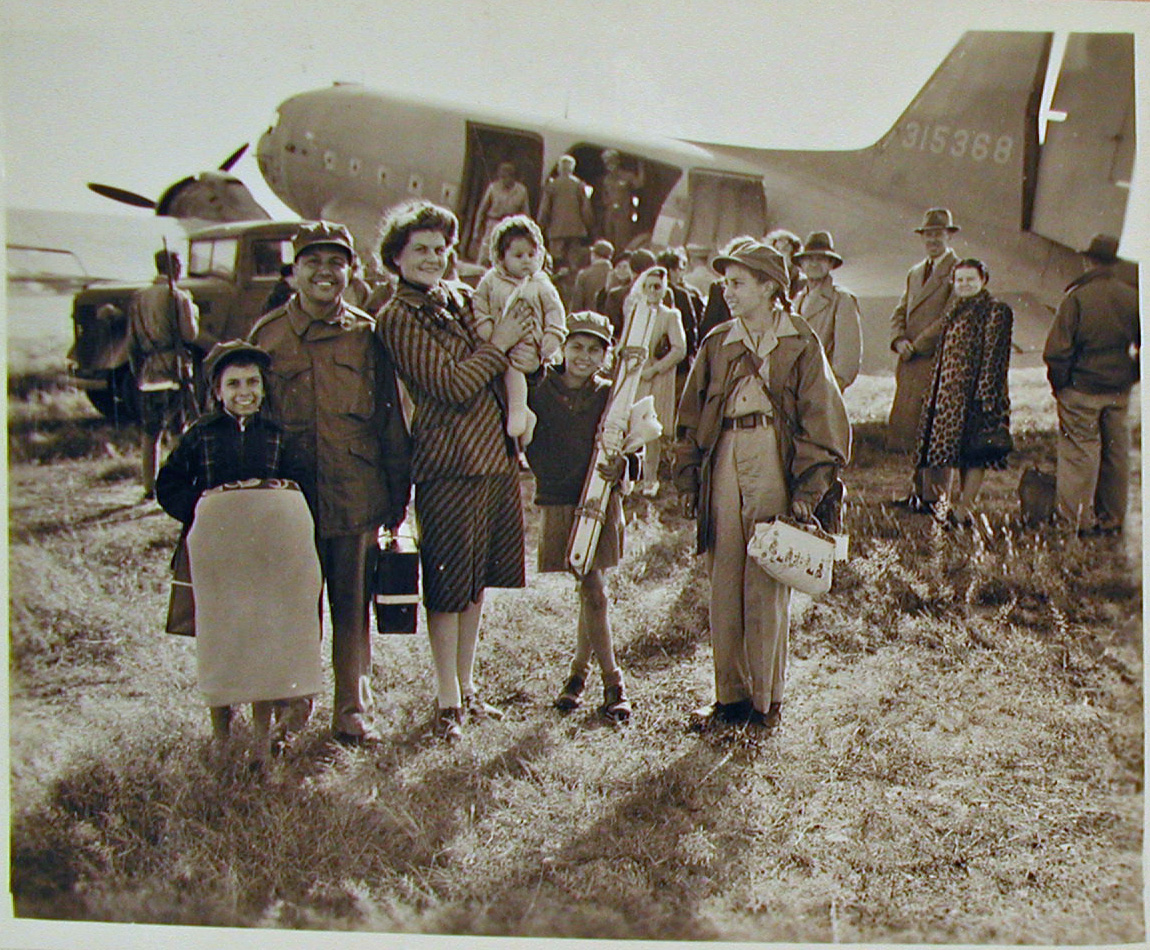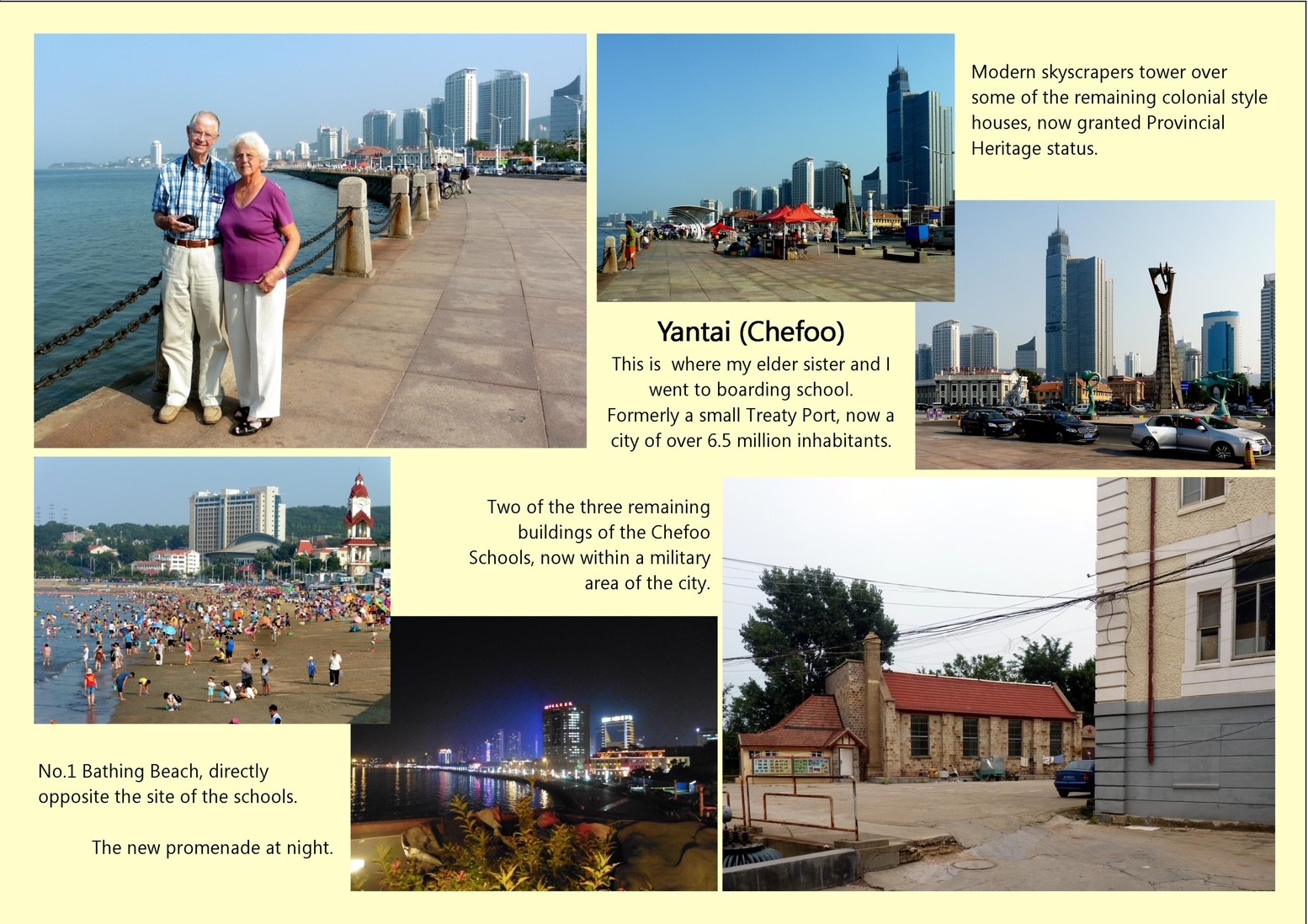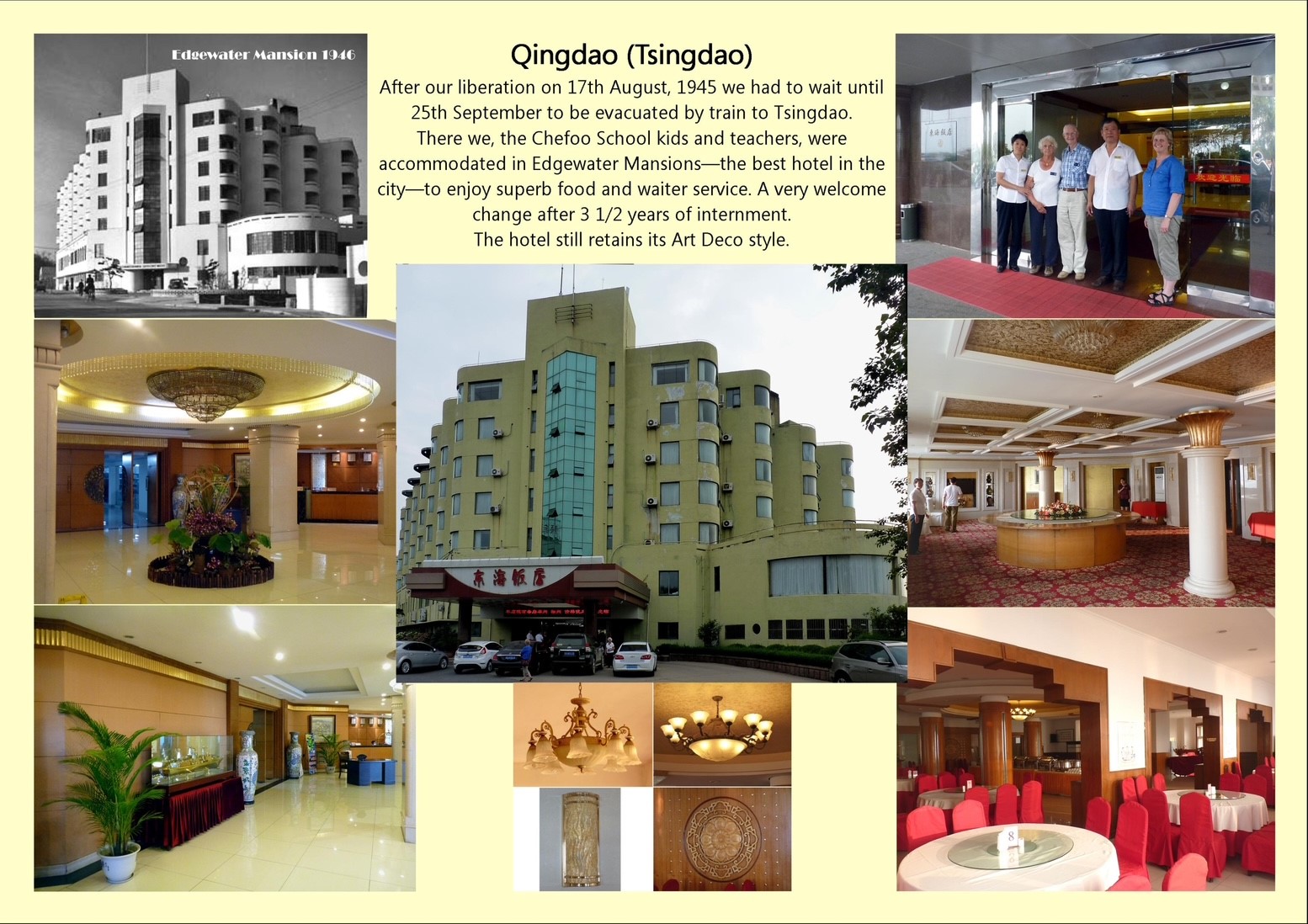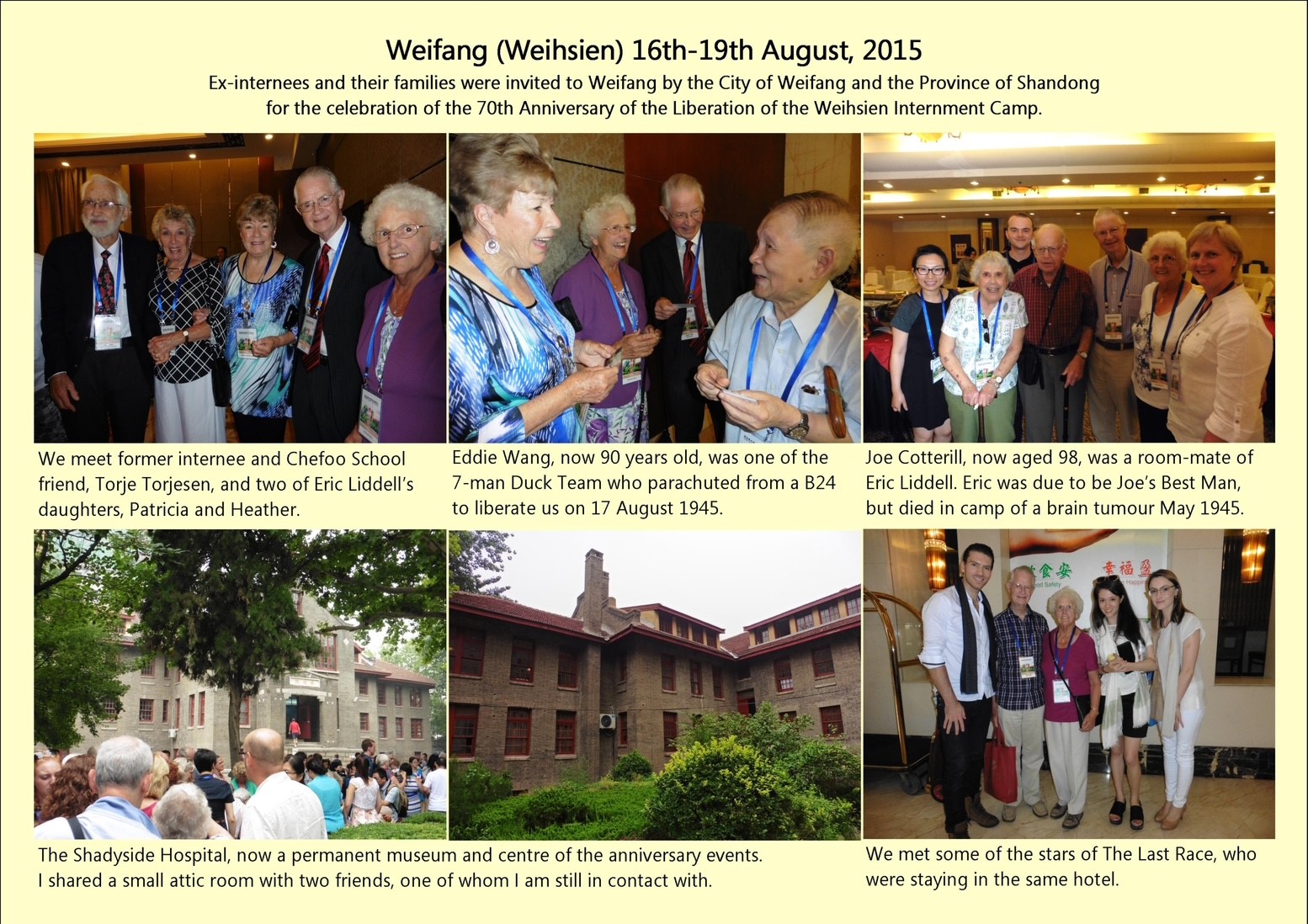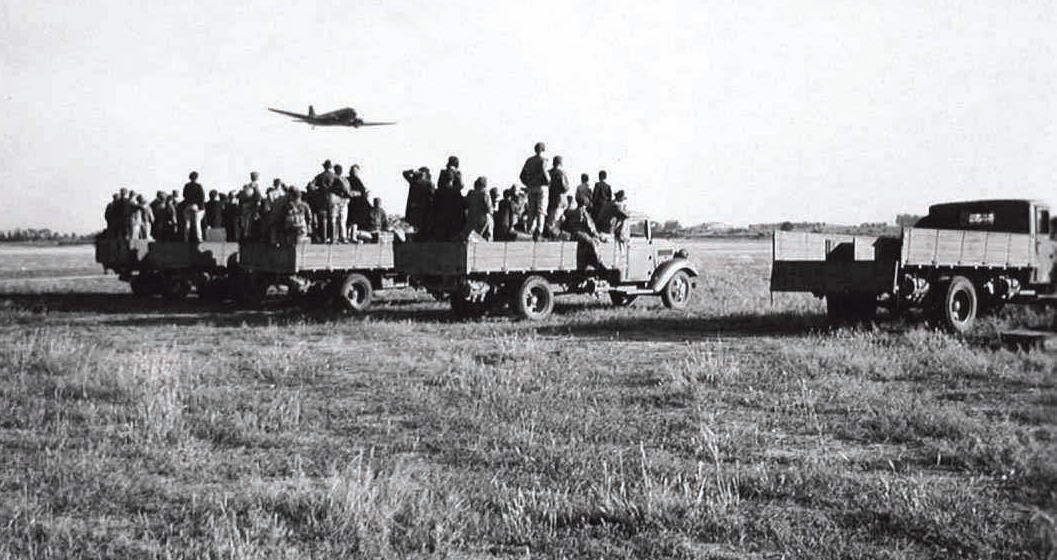
☛ ... the most recent messages are on top !
From: Angela
Sent: Monday, October 20, 2025 6:02 AM
To: Leopold Pander
Subject: Fw: The Dhunjishahs evacuating Weihsien in October 1945
hI Leopold,
Resending this - You must have posted it before?
Gather my family must have transported around
same time?
My first airplane ride!
Interesting
to read of of others especially from Maida Harris
Campbell- always wondered why her family ended
up Eastern Canada- so cold there compared to Vancouer.
cheers ange
subject: Fw: The Dhunjishahs evacuating Weihsien in October 1945
... this photo is really worth a thousand words !! It shud be
shown somewhere in the museum.
----- Forwarded Message -----
From: Angela
To: Leopold Pander
Sent: Saturday, March 9, 2019, 10:07:55 a.m. PST
Subject: Fw: Fwd: Fw: The Dhunjishahs evacuating Weihsien in October 1945
Hi Leopold,
Here is the photo - you can see how long ago it came to
me from Desmond Power who passed away last Sept.
Did I
send you an article regarding him?
He's Betty Lambert's
half brother.
His mother Gracie Lambert was Weihsien - my
birth god mother - being Irish Catholic.
Desmond was first
in Shanghai Camp but later in Weihsien as well ..... he lived
WEst Vancouver but wouldnt accept visitors - planned to see
him after I retired over 10 years ago now.
Desmond says the plane C47 - saved this photo - it was framed &
in the living room at the Dhunjishah's home - always gazed at it
when we visited them.
Michael born in camp - younger than me.
Knew them all so well - as in school with the older sisters & when
St Louis closed Michael was at St Josephs ... Mrs Dhunjishah Russian
always elegantly dressed but look at the rest of the family ....
cheers angela
***Desmond so we must have all departed Oct 1945*** - please add
that to my record
On Tue, 10/30/12, Angela wrote:
--- On Wed, 7/22/09, Desmond Power wrote:
> From: Desmond Power
> Subject: The Dhunjishahs evacuating Weihsien in October 1945
> To: "Angela Elliott"
> Cc: dhunjishahm@bellsouth.net
> Received: Wednesday, July 22, 2009, 2:21 PM
>
>Dear Angela and your friend Michael Dhunjishah.
>
>
--- On Wed, 7/22/09, Desmond Power
> From: Desmond Power
> Subject: The Dhunjishahs evacuating Weihsien in October 1945
> To: "Angela Elliott"
> Cc: dhunjishahm@bellsouth.net
> Received: Wednesday, July 22, 2009, 2:21 PM
>
>
Dear Angela and your friend Michael Dhunjishah.
>
> Thanks for your email. I’ll be interested in hearing what you think of my blog.
>
> You might have already seen this photo but just in case, it’s the Dhunjishahs dressed in GI outfits (as we all were at the time) ready to board the C47 that flew them out of Weihsien. The war ended in August but as you are aware, we didn’t get out till October.
>
> All best, Desmond.
>
>
From: Christine Sancton
Sent: Sunday, October 19, 2025 8:15 PM
To: Leopold PANDER
Subject: From Ida Talbot's diary.
18-X-45 in the air!
My dear:
I am writing the last chapter of our last years on the C-47 which is taking us to Tientsin. We left the airfield at about 1.20p.m. after quite a long wait in the boiling sun atop the trucks which brought us there. When we finally arrived at the airport, which is really only a landing strip, We didn’t have to wait long for our plane to come. We are now 8000 feet above, and the flying is just as smooth as travelling in a boat on a calm day. I am thrilled to bits about the flight. The crew is young and interested in kids. Peter, Christine and Gay are with the pilots & crew seeing how the “generator works”. We must have left Shantung Province, as the land looks mud caked & flat with occasional pools of water, which I suppose are either reservoirs or lakes.
October 25th
Tientsin
Its exactly 8 days since we landed on that colossal airfield in Tientsin after a delightful flight. Although trucks were there to meet us, we, by virtue of having babies (Christine?) travelled in a private Dodge 1941 - we were most gratified - the feel & smell of luxury is certainly satisfying to one’s senses. The streets had posters on the building walls and overhead across the streets “welcome our cooperators!...stand for peace!
The streets were crammed with aimless Chinese folk, mostly women & children.
extract from Ida Talbot's diary.
My dear:
I am writing the last chapter of our last years on the C-47 which is taking us to Tientsin. We left the airfield at about 1.20p.m. after quite a long wait in the boiling sun atop the trucks which brought us there. When we finally arrived at the airport, which is really only a landing strip, We didn’t have to wait long for our plane to come. We are now 8000 feet above, and the flying is just as smooth as travelling in a boat on a calm day. I am thrilled to bits about the flight. The crew is young and interested in kids. Peter, Christine and Gay are with the pilots & crew seeing how the “generator works”. We must have left Shantung Province, as the land looks mud caked & flat with occasional pools of water, which I suppose are either reservoirs or lakes.
October 25th
Tientsin
Its exactly 8 days since we landed on that colossal airfield in Tientsin after a delightful flight. Although trucks were there to meet us, we, by virtue of having babies (Christine?) travelled in a private Dodge 1941 - we were most gratified - the feel & smell of luxury is certainly satisfying to one’s senses. The streets had posters on the building walls and overhead across the streets “welcome our cooperators!...stand for peace!
The streets were crammed with aimless Chinese folk, mostly women & children.
extract from Ida Talbot's diary.
Christine Talbot Sancton writes:
I don't remember anything of our evacuation, I was just three years old, so I have had to rely on my mother's diaries.
We must have been evacuated on the same plane as Leopold and his family.
Many years later my sister, Gay who was 14 when we were liberated, wrote these words of gratitude.
" The organisation of Camp was superb.
There was a managing council which oversaw camp discipline, health, entertainment, sports, ran three kitchens, and so on.
To these adults we owe our survival…
- - - - To the doctors and nurses who brought new life into the world, treated the sick with the few resources they had, and helped to prevent epidemics and disease.
- - - - To those who pumped the water into cisterns day and night.
- - - - To the cooks who fed us as best they could, including the bakers (my father was one) who worked eight hour shifts stoking fires and punching dough in cold and heat.
- - - - To those who maintained the latrines and cleaned the shower huts.
- - - - To those who caught and killed flies.
- - - - To those who taught us in makeshift schools without text books, paper or pencils.
- - - - To those who gave adult classes in dozens of languages, art, music, theology, philosophy and countless other disciplines.
- - - - To those who organised sports, ran clubs and scout and guide troops.
- - - - To those who mounted plays, gave concerts, put on variety shows, arranged talks.
- - - - To those who were black marketeers, and kept us informed about the outside world.
- - - - To the Chinese who traded with us and those honeypot carriers who brought us news.
- - - - To the members of Christian churches who shared the same building for two years, showing respectful ecumenism before the word was common.
- - - - To the priests and nuns who showed me Christian faith in action.
- - - - To those who rushed out of the gate at the risk of their lives to rescue the rescuers.
- - - - To all of these unsung heroes, I give heartfelt thanks, honouring their memory, and praying for their souls.
- - - - Please feel free to remind us of others who have made a difference.- - - - .
by Gay Talbot Stratford
There was a managing council which oversaw camp discipline, health, entertainment, sports, ran three kitchens, and so on.
To these adults we owe our survival…
- - - - To the doctors and nurses who brought new life into the world, treated the sick with the few resources they had, and helped to prevent epidemics and disease.
- - - - To those who pumped the water into cisterns day and night.
- - - - To the cooks who fed us as best they could, including the bakers (my father was one) who worked eight hour shifts stoking fires and punching dough in cold and heat.
- - - - To those who maintained the latrines and cleaned the shower huts.
- - - - To those who caught and killed flies.
- - - - To those who taught us in makeshift schools without text books, paper or pencils.
- - - - To those who gave adult classes in dozens of languages, art, music, theology, philosophy and countless other disciplines.
- - - - To those who organised sports, ran clubs and scout and guide troops.
- - - - To those who mounted plays, gave concerts, put on variety shows, arranged talks.
- - - - To those who were black marketeers, and kept us informed about the outside world.
- - - - To the Chinese who traded with us and those honeypot carriers who brought us news.
- - - - To the members of Christian churches who shared the same building for two years, showing respectful ecumenism before the word was common.
- - - - To the priests and nuns who showed me Christian faith in action.
- - - - To those who rushed out of the gate at the risk of their lives to rescue the rescuers.
- - - - To all of these unsung heroes, I give heartfelt thanks, honouring their memory, and praying for their souls.
- - - - Please feel free to remind us of others who have made a difference.- - - - .
by Gay Talbot Stratford
From: Brian Kerry
Sent: Sunday, October 19, 2025 6:14 PM
To: Leopold PANDER
Cc: Leopold PANDER
Subject: Re: How we got home after the war was over
Dear all Weihsien survivors and friends,
Thank you for recent posts.
I enjoyed recalling our stay in Edgewater Mansions in Tsingdao (as it was then). Going from the deprivations of Camp life to the luxury of that lovely art deco hotel. To comfortable beds in rooms with a harbour view, lashings of hot water for baths/showers, and - best of all eating at tables with crisp linen cloths, proper tableware and waiter service of delicious meals. We were truly spoiled!
On our return visit in 2015 my wife, Ruth, daughter Cheryl and I found the hotel with the help of our local, English-speaking guide. We met the joint manageress, explained our who we were and why we were there, and were welcomed inside. The attached photos are just few I took during our conducted tour of the hotel. Afterwards we were joined by the other manager, and drank tea with them while I recounted my recollections of our stay in 1945.
Our subsequent 4 week stay in Hong Kong, although nowhere so “posh”, was very enjoyable. We were within walking distance of Kai Tak airfield, and I spent quite a lot of time there, which may well have influenced me into subsequently embarking on a 46 year career in aerospace. Off-duty airmen used to arrive in a jeep where we were staying and take us swimming. We were also free to explore and shop in small groups. A time I still recall with much happiness.
The voyage to Southampton took five weeks, and then we were reunited with parents we had not seen for five years, and met two, new younger siblings. Regretfully, you can not rewind the clock, and my sister and I never regained the same, close relationship with our parents of our early childhood. That, for us, was the most damaging result of the war.
It took both of us years before we could talk about our experiences. We never discussed them with our parents. The attitude then was to “let sleeping dogs lie” and eventually we would forget it all. But that was not the case, and we carried the hurt for very many years. My greatest regret is that I never got close to my parents again.
Ruth and I had visited China, on a two week escorted tour, in 1995, but did not visit Chefoo, Tsingdao or Weihsien ( I will stick with the old spelling). The return in 2015 for the celebration of our liberation 70 years previously, was a different matter. On this trip we planned our own itinerary, beginning and ending in Beijing, then staying briefly in Yantai (Chefoo) and Qingdao (Tsingdao) before joining others at Weifang, where we greatly enjoyed the celebrations and reunions. I even found the small attic bedroom in the hospital building (Block 61) which I had shared with John Hoyte and Theo Welch.
I am so grateful that I was able to go back, and share that part of my story with my wife and daughter.
Well, that’s enough for now! Keep well, fellow survivors, there are not many of us left now.
Best wishes,
Brian Kerry
From: Terri Stewart
Sent: Sunday, October 19, 2025 3:53 AM
To: Leopold PANDER
Subject: Re: Final departure -- October 18, 1945
Thank you Leopold for this story.
For those of us who were not there (or not yet born) it brings things into perspective of what you and your family went through, as well as thousands of others in the same situation.
Terri Stewart
From: Brian Butcher
Sent: Saturday, October 18, 2025 8:54 PM
To: Leopold PANDER
Subject: Re: Final departure -- October 18, 1945
Thank you Leopold for all that you have done with the website.
I have never seen the picture in your email, but I too am 85 years old.
I was five when we left by train to Qingdao and then by US troop ship to Hong Kong and then “home” to England.
In 1946 we left again for China a Yunnan Province high in the mountains for three years until forced to leave by the collapse of the Kuomingtang and threat to missionaries. Left China finally in 1949.
Thanks again,
Brian Butcher
From: Roy Campbell
Sent: Saturday, October 18, 2025 6:09 PM
To: Leopold PANDER
Subject: How we got home after the war was over
My name is Maida Harris now Campbell
We got out of Weihsien I believe it was early September to a wonderful welcome at the Edgewater Hotel in Tsingtao by the British troops.
We were given presents by the city.
Due to inflation the money for four of us bought one can of jam.
We were all British citizens and were given by the British govt a fare to wherever we wanted to go.
My father was British and my mother was Canadian but British since there was no Canadian citizenship until 1947.
However my aunt and grandparents also in camp got passages to Canada by American ships.
There were 3 families in camp who had an older child in Toronto in 1940 because it was safer than going to the UK.
These 3 families all wished to go to Canada but to get our way paid we had to go on a British ships.
There were to Canada and it was almost all American ships crossing the Pacific.
We travelled on an American troopship to Hongkong during or still feeling the effects of a typhoon.
Because of that we had to travel around Taiwan named Formosa then a minesweeper ahead of us to protect us.
Most of us were seasick so could not enjoy the wonderful food.
The trip was between 5 and 7 days and we arrived in Hongkong where we had wonderful food and accommodation and were treated very well by the British troops many new and young who were ready to invade Japan.
Later we wondered how many would have lost their lives if the Allies had had to invade Japan.
By the end of November all our group several hundred I think had got on British ships going to the UK.
In early December a British cargo ship was found for us that was going to Vancouver and had room for us 3 families.
It was an American-built ship that was leased to Britain.
We had almost a month trip and rough at times landing in Victoria where they dumped the ballast they had as cargo and then left us in Vancouver where we 3 families took the train and were united with the members of our families who had travelled to Toronto in 1940.
It was January 9 1946.
A group of relatives met us.
They must have found us strangely attired in clothes donated to us and not as emaciated as we might have expected having had 4 months of food given to us by Red Cross and other sources.
Maida Harris Campbell
sent from my iPad=From: Leopold PANDER
Sent: Saturday, October 18, 2025 9:42 AM
To: 'Leopold PANDER'
Subject: Final departure -- October 18, 1945
October 18, 1945 is a date to remember.
It was our last day in Weihsien and I clearly remember Dad telling me ― in English ― to have a last good look because we would never come back to this place again. We were standing on the platform of that truck lumbering through the Weihsien gates with our meager luggage and belongings. I was four years old.
Indeed, we were finally airlifted back to where we came from ― Tientsin ― all of it professionally organised by the US Air force. Who else could have done that?
Thank you, America.
August 17, 1945 ― two long months previously, we were liberated by the Americans just two days after Hirohito's unconditional surrender speech recorded and broadcast for the whole world to hear. Evacuations were immediately scheduled in Weihsien, firstly by plane for those who needed urgent assistance. Shortly afterwards, a first full trainload of prisoners left Weihsien, bound for Tsingtao with the Chefoo kids and staff and many others.
And then, all stopped. No more evacuations.
Read dad's first letters home ― in Belgium ― to his family in French. [Click here] ―I trust that you will easily get them translated into English with your browser & A.I.
The Japs had surrendered, yes, but that didn't make China a peaceful country. There was a civil war going on. "They" were blowing up the railroad tracks all over the country and killing each other in an all-over turmoil amplified by the soviets on one side and the yanks on the other side.
October 18, 1945.
Many of you were already on their way home to England, Australia, East Africa, New Zealand, Canada, America (…) mostly by boat and we ― the last ones in Weihsien ― were airlifted by twin-engine-C-47s to our homes → to Tientsin as I have already mentioned.
We finally left China in 1948.
I am now in my eighty-fifth year and that day ― October 18, 1945 ― I will remember.
Thanks for reading me,
Best regards,
Leopold
#





